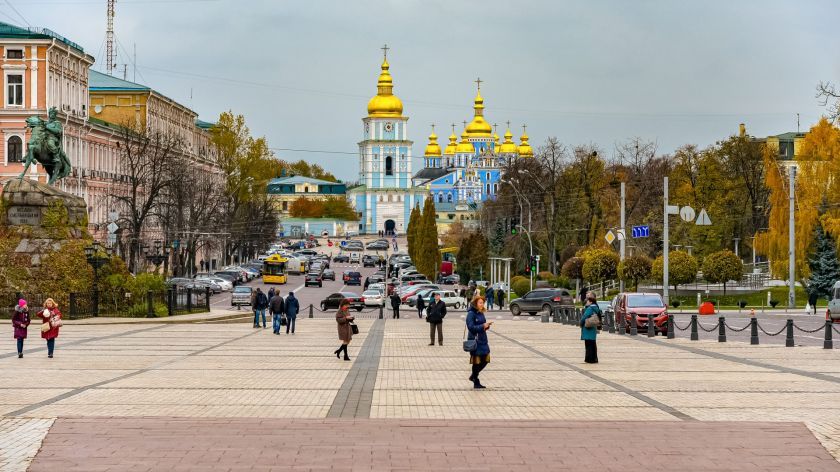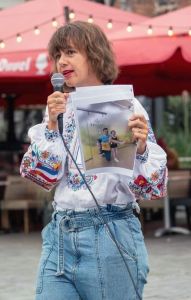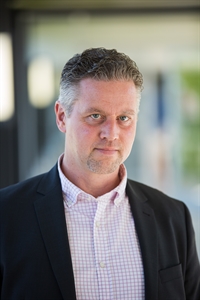Festival on Ukrainian culture is more than a show of support to country at war
-
 Kyiv. Photo by Wikimedia Commons
Kyiv. Photo by Wikimedia Commons
Ukraine is so much more than a country at war. To help Dutch people learn more about the culture, there will be a festival in the Stevenskerk. ‘Despite efforts to destroy it, our Ukrainian culture shows its resistance, strength, and creativity.’
Ukrainian national Liliya Levandovska, grant advisor at Radboud University, as well as coordinator for Nijmegen4Ukraine, is one of the organisers behind the festival. She has already organised dozens of protests with Nijmegen4Ukraine on the Grote Markt since the invasion began.

‘Planning a festival about Ukrainian culture has been on my mind for a while’, Levandovska explains. ‘Recently I was approached by the Stevenskerk, and we decided to join forces.’ The result of that effort is a three-week festival, from December 17th until January 7th.
But the event is not just a show of support for Ukraine; it is also a way for people to get to know Ukrainian culture. That culture is very important to Levandovska. ‘It’s what more or less saved me during the war. I started following Ukrainian artists who did traditional craftsmanship, so that my newsfeed consisted of more than just death and destruction.’
Resistance
This allowed Levandovska to shift focus away from the war and onto the positive aspects of the country. ‘Ukraine has a rich history and culture, and I think people will find it an interesting one to explore. I hope to show the country’s real nature; it is so much more than a country at war. Our culture reflects our society. Despite efforts to destroy it, our Ukrainian culture shows its resistance, strength, and creativity.’
‘I hope to show the country’s real nature’
The festival includes workshops where attendees can learn stitching or how to make traditional grass puppets and animals. There are also lectures and documentaries. Levandovska herself is most excited for the documentary Culture vs. war. ‘It’s about a rock band, an author, and a film director who all joined the Ukrainian military to fight’, she explains. ‘I haven’t seen it yet, but I’m very curious.’
Ammo boxes

Another part of the festival is an exhibit of roughly forty icons. The artworks will be sold, and the proceeds will help fund a mobile hospital, according to Alfons Brüning of the Institute for Eastern Christianity (Instituut voor Oosters Christendom, eds.) at Radboud University. ‘That mobile hospital is used to help transport wounded soldiers from the front lines to proper hospitals’, he says. ‘Casualties sometimes need to be moved hundreds of kilometres away, so it’s important that they have access to proper care along the way.’
The icons made by Oleksandr Klymenko and Sofja Atlantova, two Ukrainian artists from Kyiv, were painted on pieces of ammo boxes used on the eastern frontline in Ukraine. ‘The artists themselves are very religious, which is why they use elements of Eastern Christianity in their art’, Brüning explains.
‘Icons are also considered windows to eternity’
The literal translation of the Greek word ‘eikon’ (icon) is ‘image’. However, Brüning explains, an icon isn’t just any image. ‘They represent holy people from the Christian story.’ Although an icon is basically made of wood and paint, it represents so much more. ‘Icons are also considered windows to eternity. They allow us to view a different reality.’
In the case of these icons, that reality has two sides. ‘On the one hand, it shows war and death, while the other is an image of hope’, as stated by Brüning. ‘Everyone has their own interpretation.’
Gaza and Ukraine
Because of the war between Palestina and Israel, there is less and less attention paid in the media to the Ukraine conflict. This makes it much more important for Levandovska to remind people of what is still going on in the region. ‘Of course it’s terrible that there is war and that people are dying there, but that does not mean the war in Ukraine has stopped. I want to let people know that every war and every casualty is awful, but I am mainly focusing on informing people about the war in Ukraine.’
The festival’s complete programme can be found using this link.
Translated by Jasper Pesch



